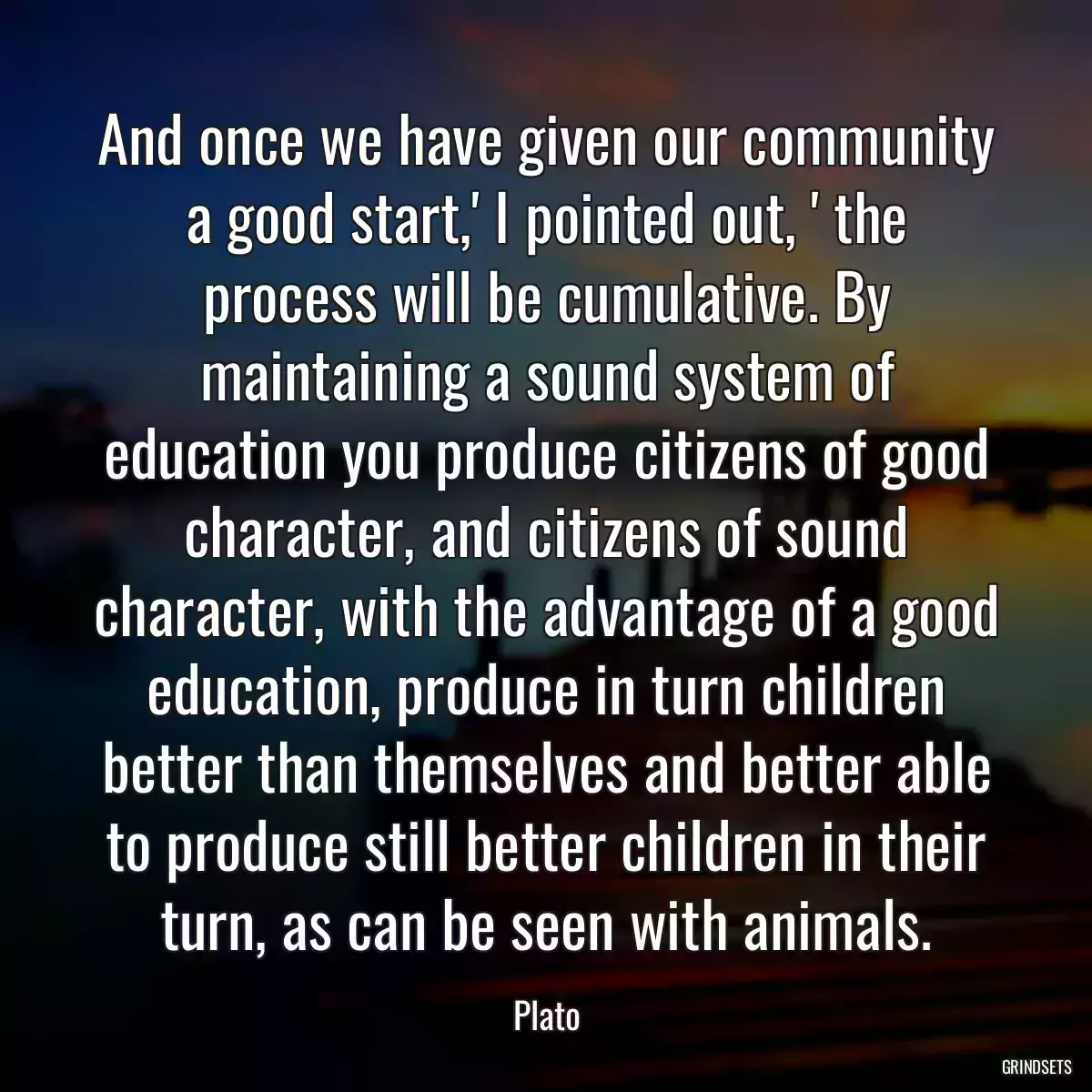
Quotes Plato - page 2
Find dozens of Plato with images to copy and share.

For the poets tell us, don't they, that the melodies they bring us are gathered from rills that run with honey, out of glens and gardens of the Muses, and they bring them as bees do honey, flying like the bees? And what they say is true, for a poet is a light and winged thing, and holy, and never able to compose until he has become inspired, and is beside himself, and reason is no longer in him. So long as he has this in his possession, no man is able to make poetry or to chant in prophecy.
No man's nature is able to know what is best for the social state of man; or, knowing, always able to do what is best.
We are too feeble and sluggish to make our way out to the upper limit of the air. If someone could reach the summit, or put on wings and fly aloft, when he put up his head he would see the world above, just as fishes see our world when they put up their heads out of the sea; and if his nature were able to bear the sight, he would recognize that that is the true heaven.
You may also like
For a poet is an airy thing, winged and holy, and he is not able to make poetry until he becomes inspired and goes out of his mind and his intellect is no longer in him.
As long as I draw breath and am able, I won't give up practicing philosophy.
Let early education be a sort of amusement. You will then be better able to find out the natural bent.
And first he will see the shadows best, next the reflections of men and other objects in the water, and then the objects themselves, then he will gaze upon the light of the moon and the stars and the spangled heaven...Last of all he will be able to see the sun.
If in a discussion of many matters ... we are not able to give perfectly exact and self-consistent accounts, do not be surprised: rather we would be content if we provide accounts that are second to none in probability.

And once we have given our community a good start,' I pointed out, ' the process will be cumulative. By maintaining a sound system of education you produce citizens of good character, and citizens of sound character, with the advantage of a good education, produce in turn children better than themselves and better able to produce still better children in their turn, as can be seen with animals.
... our purpose in founding our state was not to promote the happiness of a single class, but, so far as possible, of the whole community. Our idea was that we were most likely to justice in such a community, and so be able to decide the question we are trying to answer. We are therefore at the moment trying to construct what we think is a happy community by securing the happiness not of a select minority, but of a whole.
Life must be lived as play, playing certain games, making sacrifices, singing and dancing, and then a man will be able to propitiate the gods.
And is it not true that in like manner a leader of the people who, getting control of a docile mob, does not withhold his hand from the shedding of tribal blood, but by the customary unjust accusations brings a citizen into court and assassinates him, blotting out a human life, and with unhallowed tongue and lips that have tasted kindred blood, banishes and slays and hints at the abolition of debts and the partition of lands.
Follow your dream as long as you live, do not lessen the time of following desire, for wasting time is an abomination of the spirit.
Wherefore also these Kinds [elements] occupied different places even before the universe was organised and generated out of them. Before that time, in truth, all these were in a state devoid of reason or measure, but when the work of setting in order this Universe was being undertaken, fire and water and earth and air, although possessing some traces of their known nature, were yet disposed as everything is likely to be in the absence of God; and inasmuch as this was then their natural condition, God began by first marking them out into shapes by means of forms and numbers.
I don't know anything that gives me greater pleasure, or profit either, than talking or listening to philosophy. But when it comes to ordinary conversation, such as the stuff you talk about financiers and the money market, well, I find it pretty tiresome personally, and I feel sorry that my friends should think they're being very busy when they're really doing absolutely nothing. Of course, I know your idea of me: you think I'm just a poor unfortunate, and I shouldn't wonder if your right. But then I dont THINK that you're unfortunate - I know you are.
It seems to me that whatever else is beautiful apart from asbsolute beauty is beautiful because it partakes of that absolute beauty, and for no other reason. Do you accept this kind of causality?
And the true order of going, or being led by another, to the things of love, is to begin from the beauties of earth and mount upwards for the sake of that other beauty, using these steps only, and from one going on to two, and from two to all fair forms to fair practices, and from fair practices to fair notions, until from fair notions he arrives at the notion of absolute beauty, and at last knows what the essence of beauty is.
You may also like

And all knowledge, when separated from justice and virtue, is seen to be cunning and not wisdom; wherefore make this your first and last and constant and all-absorbing aim, to exceed, if possible, not only us but all your ancestors in virtue; and know that to excel you in virtue only brings us shame, but that to be excelled by you is a source of happiness to us.
If there were only some way of contriving that a state or an army should be made up of lovers and their beloved, they would be the very best governors of their own city, abstaining from all dishonour, and emulating one another in honour; and when fighting at each other's side, although a mere handful, they would overcome the world. For what lover would not choose rather to be seen by all mankind than by his beloved, either when abandoning his post or throwing away his arms? He would be ready to die a thousand deaths rather than endure this.